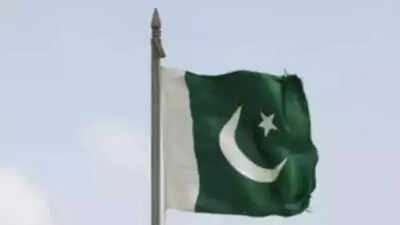Top Searches
- News
- World News
- Pakistan News
- Anti-military, anti-militant voices rise in Pakistan’s Swat
Anti-military, anti-militant voices rise in Pakistan’s Swat

ISLAMABAD: The Pakistani army is facing a growing demand from several nationalist organisations in Swat Valley of Khyber Pakhtunkhwa province to quit its anti-insurgency drive in the mountainous north-western district, saying local civilian authorities are quite capable of checking militant activities in the region.
For its part, the Khyber Pakhtunkhwa administration listed 113 crimes tied to militancy over the past three months, including 15 grenade attacks and seven targeted killings. The military has pressed more boots on the ground following escalating violence—much to the discomfiture of anti-war groups such as Pashtun Tahaffuz Movement (PTM).
PTM chief Manzoor Pashteen from South Waziristan has demanded Pakistan army’s withdrawal from Swat, saying the local civilian administration can address the challenge posed by Tehreek-e-Taliban Pakistan (TTP), also known as Pakistani Taliban, an alliance of militant networks formed in 2007 to unify opposition against the military.
There are reports of an influx of Pakistani Taliban from Afghanistan, leading to violence in Swat and adjacent Dir districts. Locals and activists see the resurgence of Taliban in the area as part of an alleged tacit agreement between the military and TTP. They called the developments a “ploy” to destabilise a region already battered by devastating floods this monsoon.
“We have no need for your (army’s) protection. Leave Swat,” read a placard at a recent protest against militancy in Mingora, the headquarters of Swat.
Among those calling for the army’s exit from Swat was Abdullah Khan, a functionary of former PM Imran Khan’s Pakistan Tehreek-i-Insaf (PTI). “I am saying (to the army) that those (TTP militants) who were brought here should be told to leave,” Abdullah said at a protest rally in Swat’s Matta tehsil on October 18.
“Leave the (militant) issue to us and our police to tackle. We’ll do that, but you just leave and go to the border (with India) where you are required,” said Khan, brother of the Khyber Pakhtunkhwa CM.
TTP has carried out isolated attacks on police, activists and school vans in Swat. Extortion calls to industrialists, traders, politicians and contractors have been traced to the outfit, and those refusing to do its bidding have been attacked with grenades.
Atif Khan, science and technology minister of Khyber Pakhtunkhwa, was asked to pay Rs 8 million. The letter said: “You know who we are, what we want... You are on TTP’s wanted list and your turn has come.” This was followed by a chilling threat: “You will either fulfil our demand…or you will lose your life.”
Although the military is engaged in a hard-bitten counter-terrorism operation along the Afghanistan border, its media wing recently denied the presence of a large number of TTP members in Swat Valley. It admitted the presence of “a small number of armed men on a few mountain tops between Swat and Dir”, and blamed social media for creating a “misperception” of a full-scale influx.
However, people dismissed the army’s statement. Large protest rallies were organised against the military’s presence over the past few weeks. Memories of Taliban rule (2007-2009) and the subsequent mass exodus triggered by the military offensive saw locals respond swiftly to the call for protests to stop the allegedly orchestrated resurgence of militancy. Politicians, activists and professionals in Swat support the anti-TTP, anti-military cause.
Swat, a pre-Partition princely state, remained autonomous till 1969 when it was merged into Pakistan by Yahya Khan, just two years before East Pakistan became Bangladesh. It is still a tax-free zone.
For its part, the Khyber Pakhtunkhwa administration listed 113 crimes tied to militancy over the past three months, including 15 grenade attacks and seven targeted killings. The military has pressed more boots on the ground following escalating violence—much to the discomfiture of anti-war groups such as Pashtun Tahaffuz Movement (PTM).
PTM chief Manzoor Pashteen from South Waziristan has demanded Pakistan army’s withdrawal from Swat, saying the local civilian administration can address the challenge posed by Tehreek-e-Taliban Pakistan (TTP), also known as Pakistani Taliban, an alliance of militant networks formed in 2007 to unify opposition against the military.
There are reports of an influx of Pakistani Taliban from Afghanistan, leading to violence in Swat and adjacent Dir districts. Locals and activists see the resurgence of Taliban in the area as part of an alleged tacit agreement between the military and TTP. They called the developments a “ploy” to destabilise a region already battered by devastating floods this monsoon.
“We have no need for your (army’s) protection. Leave Swat,” read a placard at a recent protest against militancy in Mingora, the headquarters of Swat.
Among those calling for the army’s exit from Swat was Abdullah Khan, a functionary of former PM Imran Khan’s Pakistan Tehreek-i-Insaf (PTI). “I am saying (to the army) that those (TTP militants) who were brought here should be told to leave,” Abdullah said at a protest rally in Swat’s Matta tehsil on October 18.
“Leave the (militant) issue to us and our police to tackle. We’ll do that, but you just leave and go to the border (with India) where you are required,” said Khan, brother of the Khyber Pakhtunkhwa CM.
TTP has carried out isolated attacks on police, activists and school vans in Swat. Extortion calls to industrialists, traders, politicians and contractors have been traced to the outfit, and those refusing to do its bidding have been attacked with grenades.
Atif Khan, science and technology minister of Khyber Pakhtunkhwa, was asked to pay Rs 8 million. The letter said: “You know who we are, what we want... You are on TTP’s wanted list and your turn has come.” This was followed by a chilling threat: “You will either fulfil our demand…or you will lose your life.”
Although the military is engaged in a hard-bitten counter-terrorism operation along the Afghanistan border, its media wing recently denied the presence of a large number of TTP members in Swat Valley. It admitted the presence of “a small number of armed men on a few mountain tops between Swat and Dir”, and blamed social media for creating a “misperception” of a full-scale influx.
However, people dismissed the army’s statement. Large protest rallies were organised against the military’s presence over the past few weeks. Memories of Taliban rule (2007-2009) and the subsequent mass exodus triggered by the military offensive saw locals respond swiftly to the call for protests to stop the allegedly orchestrated resurgence of militancy. Politicians, activists and professionals in Swat support the anti-TTP, anti-military cause.
Swat, a pre-Partition princely state, remained autonomous till 1969 when it was merged into Pakistan by Yahya Khan, just two years before East Pakistan became Bangladesh. It is still a tax-free zone.
FOLLOW US ON SOCIAL MEDIA
FacebookTwitterInstagramKOO APPYOUTUBE
Start a Conversation
end of article









